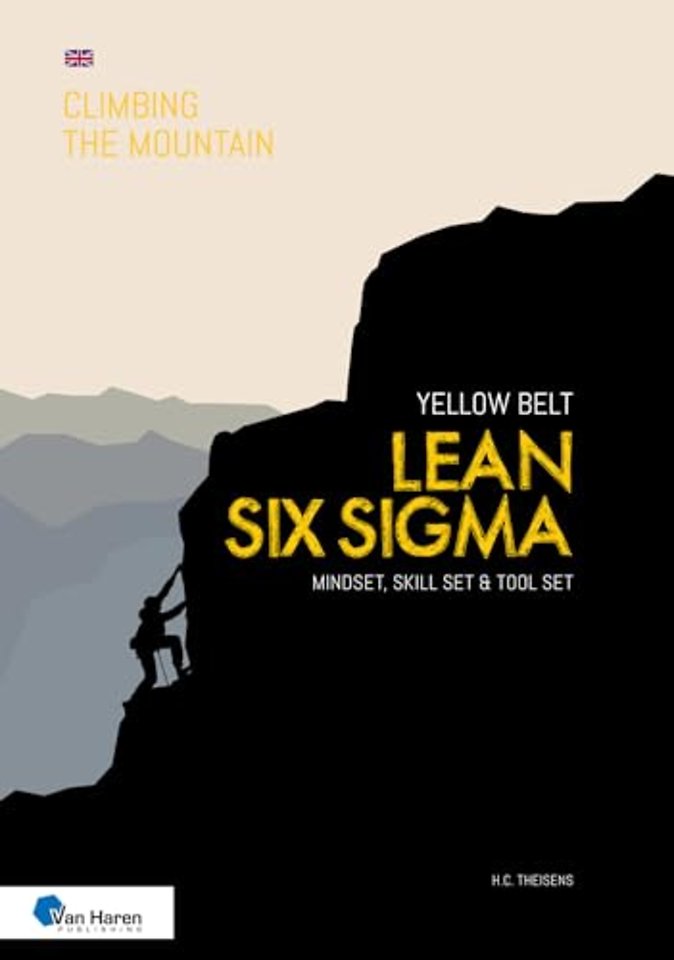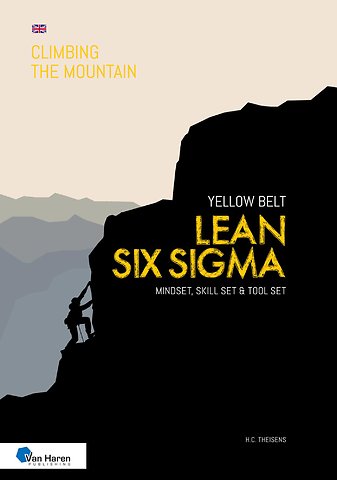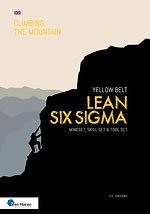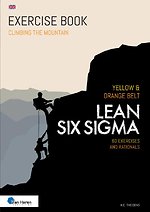


Having graduate from the University of Twente (Enschede, The Netherlands) in 1994, Theisens (1969) developed his experience of process improvement as a consultant in the automotive and high-tech industry at Texas Instruments, Sensata Technologies, Thales and several other companies.
Meer over H.C. TheisensLean Six Sigma Yellow Belt
Mindset, Skill set and Tool set
Paperback Engels 2023 1e druk 9789401809610Samenvatting
This book is intended for those who want to get started with carrying out improvement projects on the shop floor or in their own work environment.
In addition, this book is intended for anyone who participates as a team member in a larger Lean or Six Sigma, Green or Black Belt project.
In terms of structure, this book follows the LSSA syllabus for Lean Six Sigma Yellow Belt. All techniques mentioned in this syllabus are covered in this book. It is advised to also use the accompanying exercise book.
Trefwoorden
lean six sigma procesverbetering kwaliteitsmanagement value stream mapping dmaic cimm verspilling pdca kaizen 5s visueel management flow pull variatie standaardisatie statistische technieken kanban first time right gemba poka yoke verandermanagement ctq cost of poor quality voice of customer
Trefwoorden
Specificaties
Lezersrecensies
Inhoudsopgave
HOW TO USE THIS BOOK 8
PREFACE 9
1 WORLD CLASS PERFORMANCE 11
1.1 CONTINUOUS IMPROVEMENT 12
1.1.1 Continuous Improvement history 12
1.1.2 Continuous Improvement values and principles 17
1.1.3 Continuous Improvement Maturity Model (CIMM) 27
1.1.4 Continuous Improvement roles and responsibilities 30
1.2 CUSTOMER VALUE 32
1.2.1 Voice of the Customer (VOC) 32
1.2.2 Critical to Quality (CTQ) 34
2 POLICY DEVELOPMENT AND DEPLOYMENT 37
2.1 POLICY DEVELOPMENT 38
2.1.1 Vision & True North 38
2.1.2 Transformation roadmap 41
2.1.3 Performance and financial metrics 42
2.2 POLICY DEPLOYMENT 45
2.2.1 Management of change 46
3 PROJECT MANAGEMENT 49
3.1 MANAGING A PROJECT 50
3.1.1 Project selection 50
3.1.2 Project charter 52
3.2 PROCESS IMPROVEMENT ROADMAPS 55
3.2.1 Kaizen roadmap (PDCA) 55
3.2.2 Lean Six Sigma roadmap (DMAIC) 58
3.2.3 Scrum 61
4 CIMM LEVEL I – CREATING A SOLID FOUNDATION (STRUCTURED) 65
4.1 PROFESSIONAL WORK ENVIRONMENT 66
4.1.1 Organized Work Environment (5S) 66
4.2 STANDARDIZED WORK 72
4.2.1 Standard Operating Procedure 72
4.3 QUALITY MANAGEMENT 75
4.3.1 Quality Management System 75
5 CIMM LEVEL II – CREATING A CONTINUOUS IMPROVEMENT ENVIRONMENT (MANAGED) 79
5.1 VISUAL MANAGEMENT 80
5.1.1 Visual work environment 80
5.2 PERFORMANCE MANAGEMENT 82
5.2.1 Daily stand-up meetings 82
5.2.2 Kaizen events and problem solving 86
5.3 BASIC QUALITY TOOLS 89
5.3.1 Brainstorm techniques 89
5.3.2 Visualization of data 94
6 CIMM LEVEL III – CREATING STABLE AND EFFICIENT PROCESSES (PREDICTABLE) 103
DEFINE 105
6.1 PROCESS MAPPING 105
6.1.1 High level process description and SIPOC 105
6.1.2 Process Flow diagram 110
MEASURE 112
6.2 PERFORMANCE MANAGEMENT 112
6.2.1 Performance metrics (Time) 112
6.2.2 Performance metrics (Quality) 116
6.3 BASIC STATISTICS 118
6.3.1 Data types and Measurement scales 118
6.3.2 Data collection tools 121
ANALYZE 124
6.4 VALUE STREAM ANALYSIS 124
6.4.1 Value adding versus Non-value adding 124
6.4.2 Value Stream Mapping (Current State) 125
IMPROVE 126
6.5 REDUCING MUDA (WASTE) 126
6.5.1 Waste identification and elimination 126
6.6 REDUCING MURI (OVERBURDEN) 129
6.6.1 Flow 129
6.6.2 Work balancing 131
6.7 REDUCING MURA (UNEVENNESS) 132
6.7.1 Pull 133
6.8 VALUE STREAM IMPROVEMENT 137
6.8.1 Value Stream Mapping (Future State) 137
CONTROL 139
6.9 PROCESS AND QUALITY CONTROL 139
6.9.1 First Time Right (FTR) 140
7 CIMM LEVEL IV – CREATING CAPABLE PROCESSES (CAPABLE) 145
7.1 STATISTICAL TECHNIQUES 147
7.1.1 Variation 147
7.1.2 Sampling 152
7.2 DISTRIBUTIONS 155
7.3 MEASUREMENT SYSTEMS 156
7.3.1 Measurement System Analysis (MSA) 156
7.4 HYPOTHESIS TESTING AND CONFIDENCE INTERVALS 160
7.4.1 Hypothesis testing 160
7.5 TESTS FOR MEANS, PROPORTIONS AND VARIANCES 162
7.6 CORRELATION AND REGRESSION 163
7.6.1 Correlation coefficient 163
7.6.2 Regression analysis 164
8 CIMM LEVEL V – CREATING FUTURE-PROOF PROCESSES (SUSTAINED) 167
APPENDIX A – THEORETICAL ASSESSMENT 168
APPENDIX B – REFERENCES 169
APPENDIX C – ABBREVIATIONS 170
INDEX 174
Vaak samen gekocht
Anderen die dit boek kochten, kochten ook
Rubrieken
- advisering
- algemeen management
- coaching en trainen
- communicatie en media
- economie
- financieel management
- inkoop en logistiek
- internet en social media
- it-management / ict
- juridisch
- leiderschap
- marketing
- mens en maatschappij
- non-profit
- ondernemen
- organisatiekunde
- personal finance
- personeelsmanagement
- persoonlijke effectiviteit
- projectmanagement
- psychologie
- reclame en verkoop
- strategisch management
- verandermanagement
- werk en loopbaan







